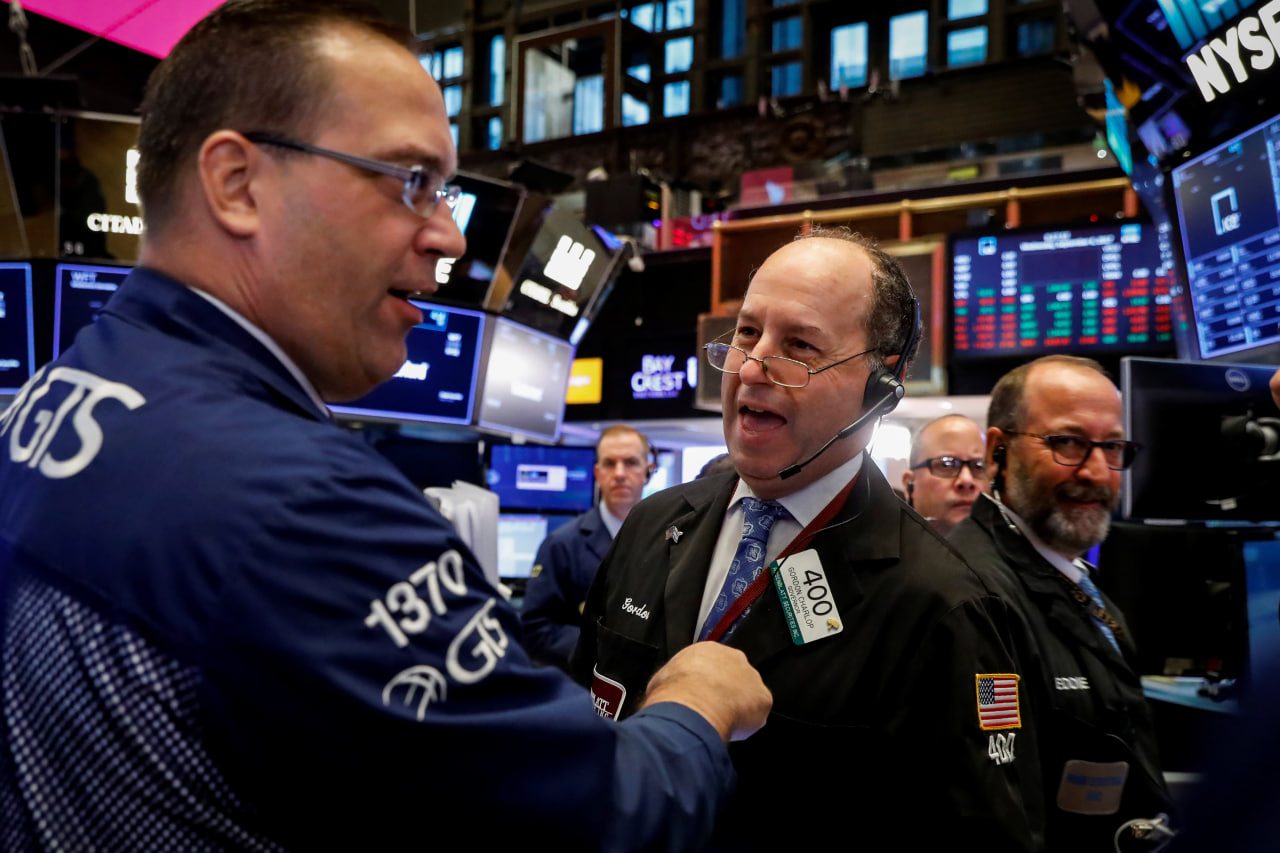美股震荡:金融股领涨,科技巨头遇冷,小盘股强势反弹!
元描述: 美股市场周三上演精彩一幕!金融股和小型股强势崛起,而科技巨头却表现低迷。本文深入分析市场动态、热门股票表现及公司新闻,揭秘市场背后隐藏的投资逻辑。关键词:美股,金融股,科技股,小盘股,市场分析,投资逻辑,股票市场
Whoa! Talk about a rollercoaster ride! Wednesday's US stock market action was a real head-scratcher, a mixed bag of winners and losers that left even seasoned investors wondering what hit them. While the tech titans stumbled, the financial sector and small-cap stocks roared back to life, sending the major indices soaring. This wasn't your typical market day, folks; it was a fascinating display of shifting investor sentiment and the ongoing tug-of-war between different sectors. We saw a dramatic shift in investor focus, a clear move away from the previously dominant tech giants towards the more established financial players. This wasn't just a blip on the radar; it's a significant trend that requires a close look. This detailed analysis will delve deep into the factors driving this market movement, examining the stellar performance of the financial sector, the surprising comeback of small-cap stocks, and the relative underperformance of the tech giants. Prepare to unlock the secrets behind this market drama—we'll uncover the key insights that every investor needs to know. We'll unpack the reasons behind the market's movements, exploring the shifting dynamics of investor sentiment and the implications for your portfolio. Buckle up, because it's going to be a wild ride!
金融股强势崛起:利率环境与盈利能力的完美结合
The financial sector absolutely killed it on Wednesday. Top banks like Morgan Stanley (MS) and Goldman Sachs (GS) reported earnings that significantly beat expectations. This wasn't just a case of a few big players; even regional banks, traditionally less reliant on investment banking, exceeded expectations. Why the sudden surge in confidence? It all boils down to the current interest rate environment. As Piper Sandler's Chief Investment Strategist, Michael Kantrowitz, aptly pointed out, the current rate hikes are a boon for bank profitability. This is a game-changer, folks. Higher interest rates translate directly into higher net interest margins for banks, boosting their bottom lines. This presents a compelling counterpoint to the tech sector's recent struggles. The market's apparently decided to "rotate" out of the tech sector which already reflected the enthusiasm for AI.
This shift in investor focus is perfectly logical. For months, the tech sector, fueled by the AI hype train, had been the darling of Wall Street. However, the reality is that many tech companies are struggling with profitability, even as their stock valuations soared. Investors, smart cookies that they are, are finally starting to demand demonstrable profits. Banks, on the other hand, are delivering.
This isn't a short-term trend either; the shift towards financial companies is likely to continue for a while, especially if interest rates remain elevated. The situation is a classic case of "buy low, sell high." Investors are selling some of their overvalued tech stocks and using those profits to snap up undervalued financial stocks, creating a ripple effect across the market.
小盘股的强劲反弹:估值低,增长潜力大
The Russell 2000 index, a barometer for small-cap stocks, hit its highest level in nearly three years. This is a huge deal. For over three and a half years, small-cap stocks had been underperforming, but the tide has finally turned. Morgan Stanley, for one, recently upgraded its outlook on small-cap stocks to "neutral" after years of negative sentiment. This marks a significant shift in market perspective. This positive outlook isn't based on wishful thinking; it's rooted in solid fundamentals. Small-cap stocks are currently trading at relatively low valuations, offering a significant potential for growth. While this narrative has been simmering for a couple of years, the sustained period of improved earnings expectations has finally ignited investor enthusiasm.
LPL Financial's Adam Turnquist offers a compelling perspective on this recent small-cap rally. He highlights that small-cap stocks were consolidating their positions for several months, amidst investor uncertainty about the "soft landing" scenario and the Federal Reserve's monetary policy trajectory. However, the recent better-than-expected economic growth figures, coupled with growing expectations of Fed rate cuts, have triggered a bounce-back. The robust performance of the banking sector has further fueled this upward momentum in the small-cap space. It's a perfect storm of positive indicators.
科技巨头遇冷:AI热潮后的冷静思考
While the financial and small-cap sectors were celebrating, the tech giants were experiencing a bit of a chill. Many of the big names, including Intel, Meta, Amazon, Google, Microsoft, Netflix, and Apple, saw slight declines. Nvidia, however, bucked the trend, registering a significant increase, and Tesla also showed positive movement. This divergence speaks volumes. This isn't necessarily a sign of technological stagnation, but rather a correction after a period of aggressive growth fueled by AI hype. While the long-term potential of AI remains undeniable, investors seem to be taking a breather, reassessing valuations, and looking for more concrete evidence of profitability.
The market is becoming increasingly discerning. The days of blindly investing in any company associated with "AI" are over. Investors now demand demonstrable results, a shift that's forcing tech companies to prove their long-term viability beyond the hype.
市场动态:道指重回43000点上方
The major indices all closed in the green, a welcome sight for investors. The Dow Jones Industrial Average surged past 43,000 points again, recouping most of the previous day's losses. The S&P 500 came tantalizingly close to another closing milestone. The Nasdaq also experienced a modest increase. Sector-specific ETFs reflected the broader market trends, with gains in various sectors such as airlines, utilities, financials, and energy.
热门个股表现:赢家通吃,输家惨淡
The individual stock performance was a mixed bag, highlighting the selectivity of the market. While some stocks soared, others experienced significant drops. NovaVax, for example, plummeted nearly 20% following a clinical trial halt by the FDA related to a serious adverse event. Conversely, Trump Media & Technology Group experienced a massive surge, reflecting continued market speculation about the upcoming presidential election. This demonstrates the volatility inherent in the market, emphasizing the crucial role of fundamental analysis and risk management in investment decisions.
其他公司新闻:空客裁员,通用汽车投资锂矿
The news wasn't all about stock market fluctuations. Airbus announced plans to cut 2,500 jobs in its defense and space division, citing a challenging business environment. Alcoa reported better-than-expected earnings, boosting investor confidence. Apple's chief human resources officer is departing after less than two years. General Motors invested heavily in a major US lithium project, underlining automotive industry's commitment to EV battery supply chain security. These events highlight the dynamic and multifaceted nature of the business world, influencing investor sentiment and market dynamics.
常见问题解答 (FAQ)
Q1: What caused the shift in investor sentiment from tech stocks to financial stocks?
A1: The primary driver is the current interest rate environment. Higher interest rates significantly boost bank profitability, making them a more attractive investment compared to many tech companies that are struggling with profitability despite high valuations.
Q2: Are small-cap stocks a good investment now?
A2: Small-cap stocks offer a potential for substantial growth, especially considering their relatively low valuations. However, small-cap investments inherently carry a higher level of risk compared to larger, more established companies.
Q3: What's the outlook for the tech sector?
A3: The tech sector is likely to experience greater volatility in the near future. While the long-term prospects of AI remain strong, investors are taking a more cautious approach, focusing on profitability and sustainable growth.
Q4: How does the upcoming US presidential election impact the market?
A4: The election adds another layer of uncertainty to the market. The anticipation of a Trump victory is already influencing certain sectors, like media and technology companies, but the overall impact remains to be seen.
Q5: What are the key risk factors to consider in the current market?
A5: Geopolitical uncertainty, inflation, interest rate hikes, and the potential for a recession all continue to pose risks. Diversification and a robust risk management strategy are crucial.
Q6: Should I immediately switch my investments based on this market analysis?
A6: No. This is just a snapshot of a dynamic market. Before making any investment decisions, consult with a qualified financial advisor and conduct thorough research to align your choices with your personal risk tolerance and long-term investment goals. Don't panic; plan strategically.
结论:谨慎乐观,动态调整
Wednesday's market action demonstrated the unpredictable nature of the stock market. While the financial sector and small-cap stocks performed strongly, the tech giants underperformed. This shift in investor sentiment highlights the importance of diversification and adapting to changing market dynamics. In conclusion, while the short-term outlook remains somewhat uncertain, several factors suggest a cautiously optimistic outlook for the coming months: the improved performance of the banking sector, the potential for higher earnings in small-cap companies, and the ongoing adjustments in the technology sector. It's crucial to monitor these trends closely, stay informed, and make investment decisions based on a thorough analysis of your risk tolerance and financial goals. The market is ever-evolving, and adaptability is key.



